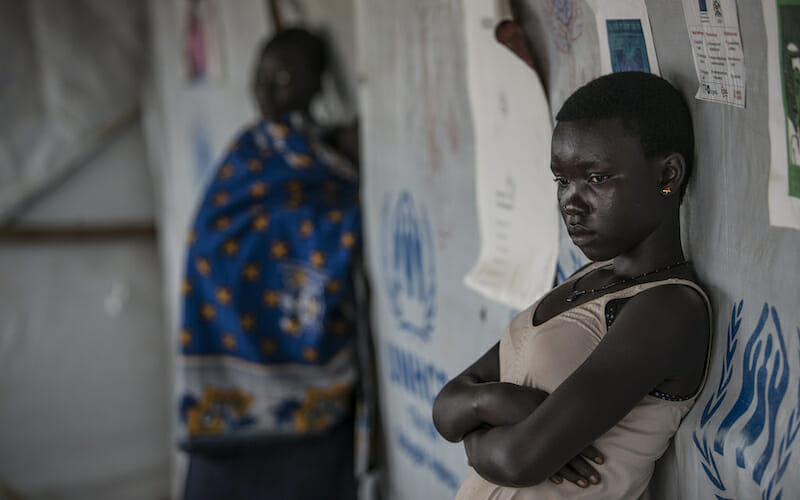
Africa in 2018: On the Rise or Retreating?
At the end of January, African leaders from across the continent will meet in Addis Ababa for the 30th summit of the African Union (AU). But this year’s slogan – ‘Towards a peaceful, prosperous and integrated Africa’ – is awkwardly juxtaposed against a backdrop of political instability and a humanitarian disaster that was a feature of 2017 and shows little sign of abating in the year ahead.
2017: the demise of dictators
On one hand, a notable political thread over the past twelve months has been the public demise of a number of long-standing African strongmen. Heads of state including Yahya Jammeh of Gambia, Angola’s José Eduardo Dos Santos, and Zimbabwe’s Robert Mugabe were ousted after decades of misrule, bringing a fresh wave of hope to the continent.
Most stunning was the removal of Mugabe, who was unceremoniously evicted from his 37-year presidential tenure via a brisk military intervention dubbed ‘Operation Restore Legacy’. His fate may be seen as a cautionary tale for other superannuated African leaders, including Cameroon’s Paul Biya, Teodoro Obiang Nguema of Equatorial Guinea, Congo Republic’s General Denis Sassou-Nguesso, Uganda’s Yoweri Museveni, and the Democratic Republic of Congo’s Joseph Kabila.
Hanging on for dear life
For many of these rulers, however, the departure of the likes of Mugabe will only give them all the more reason to try to dig in their heels in the short-term. The DRC is a textbook example of such tendencies.
Over the past year, violence has surged in the resource-rich African nation as President Kabila, now in his 16th year of power, attempts to crush the opposition and consolidate his grip on power. He refused to resign following the conclusion of his last term in December 2016 and since delayed implementing an agreement made under the aegis of the influential Congolese Catholic Church that required him to step down by the end of 2017.
Opposition leaders, including exiled presidential hopeful Moïse Katumbi, have lent their full support to Church leaders, who helped organize massive street protests as the deadline for Kabila’s resignation approached last month. Yet their demonstrations were met with disproportionate violence, with at least eight deaths reported in the early hours of the new year. The violent silencing of the Church, which has acted as a key mediator in the on-going political crisis, raises questions about when, if ever, new leaders like Katumbi might run for the chance to bring back stability to the country.
Elections are no panacea
While countries like the DRC implode as their presidents turn into dictators in all but name, the prospect of elections in other, particularly unstable nations are not expected to make matters any better. According to the international non-profit organization ACAPS, for instance, upcoming elections in Libya and South Sudan are likely to exacerbate rather than soothe tensions.
In Libya, a planned referendum on a new constitution, as well as presidential and legislative elections (per its 2015 commitment) are now overdue, as political rivals fail to agree on amendments to the UN-proposed Government of National Accord (GNA). Yet any consensus looks increasingly unlikely, raising chances of a violent outcome within the coming months.
2018 will also be crunch time for South Sudan, as political leaders come under pressure to negotiate a new peace agreement and prepare for elections slated for later in the year. Yet observers have low expectations that the peace process will make real headway towards ending the four-year civil war, with the parties to the conflict demonstrating little willingness to work together to achieve political progress. Growing factionalism within the Sudan People’s Liberation Movement-North and lack of government accountability are also raising the risk that violence could resurge this year.
The human cost of political instability
Not surprisingly, as political instability grows, so do humanitarian crises across the continent. A recent report by ACAPS examined the anticipated needs of 18 countries and singled out Ethiopia, Mali, South Sudan, Somalia, the DRC, Central African Republic, and Libya as potential hotspots in 2018.
First, due to climate and geopolitical factors, Ethiopia, northeast Nigeria, South Sudan, and Somalia are predicted to face heightened risk of famine. Militants from Islamic State are also expected to gain power and resources in southern Libya and Puntland, Somalia, despite having suffered setbacks in their strongholds in Iraq. In central Mali, militant groups are projected to exploit the withdrawal of state troops to expand their recruitment and rearmament efforts. Meanwhile, in the precarious Central African Republic, the breakup of armed groups is slated to deepen violence and scatter refugees into neighboring DRC and Cameroon – two countries that are hardly prepared to welcome newcomers.
The United Nations (UN) has also expressed concern over what it considers likely to be record levels of humanitarian needs in 2018 as violence, displacement and hunger are expected to render almost 136 million people in need of aid. As a result, the UN’s Office for the Coordination of Humanitarian Affairs (OCHA) has appealed for $22.5 billion to offer humanitarian responses across the globe.
Faced with such challenges and with a whopping 18 elections scheduled for 2018, the AU and its members now have an urgent duty to put the continent on an even keel. During the last biannual summit, unfortunately, despite announcing new initiatives to fight youth unemployment and HIV/AIDS, heads of state and AU officials did nothing to bring figures like Joseph Kabila in line. They will need to realize that failure to act this time around could be the straw that breaks the camel’s back.

